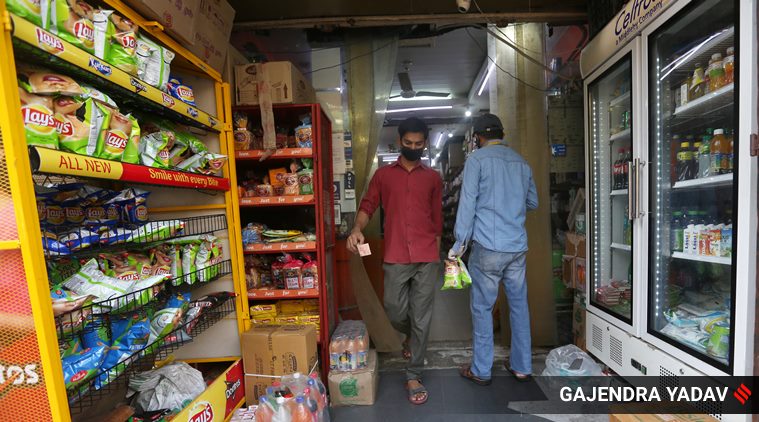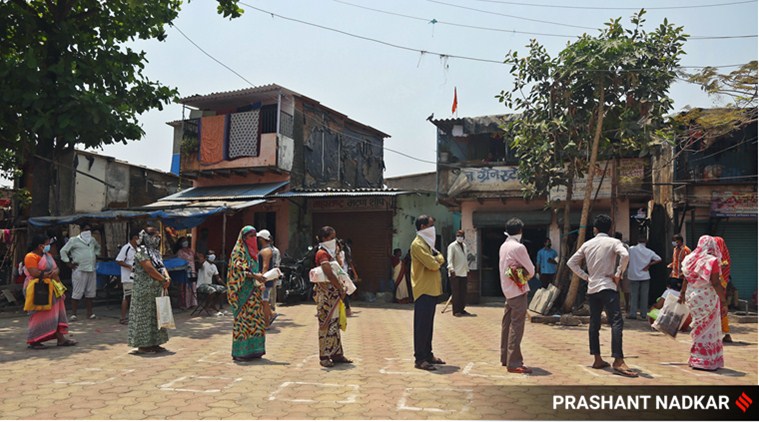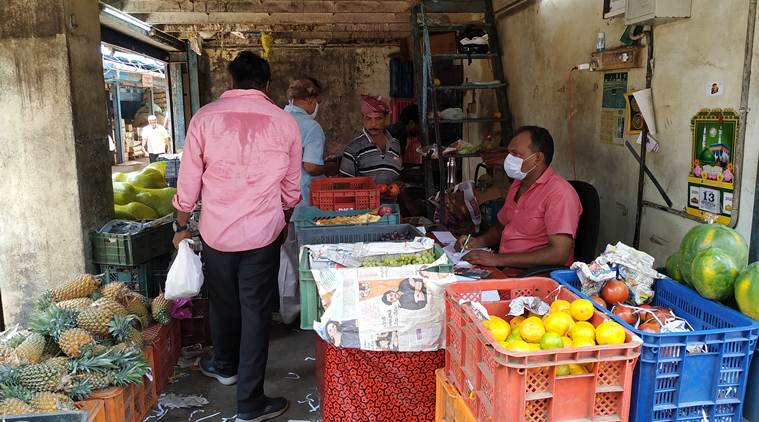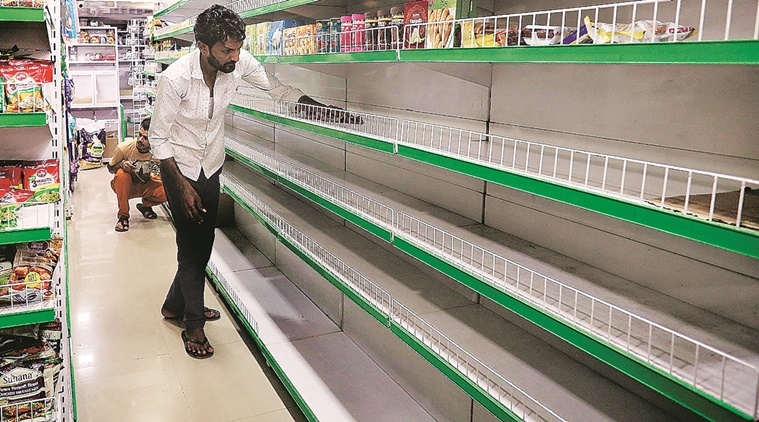 A grocery shop in Mayur Vihar in Delhi (Express Photo by Gajendra Yadav)
A grocery shop in Mayur Vihar in Delhi (Express Photo by Gajendra Yadav)
FROM a South Mumbai cafe that wound up after 10 years in operations to a standalone salon in the heart of the capital that is unsure whether it can ever start again to an eatery in Meerut’s shopping hub launched by a first-time entrepreneur with his personal savings – each distress story in the Micro, Small and Medium Enterprises sector is unique but all of them have the same refrain.
Operations built on the back of personal savings, sweat and struggle, now face the end of the road. For, it is not just the problem of how to survive the current phase, but questions more basic: how difficult will it be to pick up the pieces when things inch back to normal? Will there be a demand for their services to ensure viability?
These beneficiaries of India’s consumption boom, helped in recent years by online apps and delivery options, now stare at a bleak future as beauty parlours, spas, restaurants, retail stores, guest houses, and several other segments of the services trade face up to what lies on the other side of the pandemic.
Till then, the dice is loaded: there is no credit to tide over the lockdown phase, new credit cycle rules entail vendors demanding ready cash even as buyers are unwilling to pay on delivery, the depleting working capital on payouts such as rent, electricity and salaries, and a complete lack of certainty on when demand will be back – if at all.
Take 43-year old Vishal Batra, who ventured out of family business to start his own in January 2020. His eatery in Meerut’s main market area held early promise, launched with an investment of Rs 10 lakh he pooled from his savings and some family assistance. Then the lockdown hit.
Revenues are zero, but Batra has to pay shop rent and staff salaries, in addition to paying food expenses for seven employees who are stranded in Meerut.
 People stand in queue outside a grocery store amidst a nationwide lockdown
People stand in queue outside a grocery store amidst a nationwide lockdown
“It takes time for a new business to pick up and we had just began covering our expenses, but in March, the lockdown started. In the first week of April, we started selling through Zomato, but barely 10 days later, the pizza-delivery case (case of a pizza delivery boy testing positive for coronavirus in Delhi, leading to 72 families to whom he delivered and 17 other delivery boys being quarantined) happened and our orders fell sharply,” Batra said. He had to down the shutters for the time being.
Chef Pooja Dhingra in Mumbai is far away from Batra and Meerut but the concern is identical. Earlier this month, Dhingra had to pull the plug on her Le15 Café in downtown Mumbai after 10 years in operations.
Before giving up the lease on the café, Dhingra had contemplated other options: renegotiating the cafe’s rent to downsizing her team and operating as a delivery-only business. Yet, the “exceptionally high” costs of running a restaurant in Mumbai, coupled with a lack of customers, made it impossible to continue, she said.
But, more importantly, it was when she looked at the next six months that the prospects looked grim. “Most of our customers were tourists. That plus the onset of the monsoons would reduce footfalls. The bleed over the next six months is one we couldn’t afford as a business,” she told The Indian Express.
 For small enterprises, the problems are multi-fold – from credit availability to lack of working capital to issues in encashing their assets even if they were to shut shop.
For small enterprises, the problems are multi-fold – from credit availability to lack of working capital to issues in encashing their assets even if they were to shut shop.
The owners of the 12-member strong Elvis and Reema Salon in Greater Kailash-1, a popular standalone salon that would receive, on an average, around 500 clients a month before the lockdown, are not sure how much longer they can sustain themselves.
Reema Bhatia, co-founder, expects clientele to nearly halve if and when they reopen due to social distancing norms.
“Our major business comes from longer, more elaborate services, which we don’t think anyone will want. They will want to come and quickly get minor services done and leave. We are getting some requests from our regular clients asking us when we will open up again, but even if we do, we don’t expect all our customers to return,” she told The Indian Express.
The salon has been struggling to pay its costs, which account for nearly 50 percent of its revenues, because right now “there is no revenue, and we are a business that operates on daily earnings.”
While the salon has some savings, costs like rent, electricity and water bills and salaries of its employees, have depleted its reserves. It expects to run out of savings in the next month or so, according to Bhatia. “All of a sudden, when you don’t get to work for two months, it sets you back,” she said. “It is heart breaking for me to even think about laying off some of my team. I can’t do that, because where would they go? Even bigger salon chains won’t be hiring during this time,” she said.
For small enterprises, the problems are multi-fold – from credit availability to lack of working capital to issues in encashing their assets even if they were to shut shop.
Service sector firms in the downstream logistics business too are facing challenges. Aakanksha Bhargava, CEO of PM Relocations, a Gurugram-based packing and moving company with an annual turnover of about Rs 72 crore, said the drying up of working capital is a major challenge. This strain has resulted in a cash crunch for employers like Bhargava to pay salaries for April to her staff of 500 employees in 10 offices across the country. “Landlords are not waiving the rent by even a nominal percentage, forget about agreeing to delayed payments. So, there’s pressure of payment of rents for offices and warehouses along with salaries when revenues have become zero,” she said.
 A departmental store, which has almost run out of stock in Navi Mumbai (Photo by Amit Chakravarty)
A departmental store, which has almost run out of stock in Navi Mumbai (Photo by Amit Chakravarty)
The event management segment where contract employees get a steady stream of income during marriages and other functions have been hit hard. “Many people associated in our business – such as caterer, chef, fruit suppliers, confectioners – have lost their livelihood. We don’t expect the marriage, celebrations business to improve in the next six months,” said Manish Goel, proprietor at Ludhiana-based, Sri Laxmi Fabrics, which provides fabrics, decor and catering services.
Across the board, the demand for a relief package from the Government centres around liquidity and capital protection. Logistics company PM Relocations’ Bhargava says the government should take care of the Provident Fund contributions for even micro and small enterprises, in addition to the already announced support measures for a section of companies.
Many said labour laws should be tweaked to support businesses to allow measures such as overtime to be permitted for next few months. “Once lockdown gets over, the concern is that workers may demand leaves later in the year and that will be a double whammy since industries would be in crucial revival mode,” an industry representative said.
Other entrepreneurs have ensured that their the workers who chose to stay back are taken care of. Vipul Ray of Vadodara-based Elmex Controls, which counts Honeywell Automation and Rockwell Automation among its customers, is one such unit. “MSMEs are typically owner-driven companies, so the culture is more of a family business.
While they may not be in a position to meet the government-mandated legal requirements, they meet their own moral requirements. They will see to it that medicines and ration issues are taken care of until things go back to normal,” Ray told The Indian Express.
Until then, all eyes are on the Government. An entrepreneur in Mumbai speaks for all: “The Government is all in all, especially for small businesses which have to comply with a bunch of regulations and laws. Our appeal to the Government is you regulate everything, you decide on taxes, you say protect the livelihood of employees, what’s your responsibility at this, our darkest hour?”
(Tomorrow: The Emergency Wishlist: Capital, safety net for labour, easing of curbs)
(Additional reporting by Aanchal Magazine, Sandeep Singh)